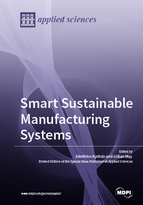Smart Sustainable Manufacturing Systems
A special issue of Applied Sciences (ISSN 2076-3417). This special issue belongs to the section "Mechanical Engineering".
Deadline for manuscript submissions: closed (30 June 2018) | Viewed by 63065
Special Issue Editors
Interests: ICT for sustainable manufacturing; closed loop lifecycle management; lifecycle performance evaluation; engineering asset lifecycle management; predictive manufacturing; product-process modelling; ontology-based engineering; context aware enterprise applications; knowledge management; industrial ontologies
Special Issues, Collections and Topics in MDPI journals
Interests: operations management; energy management in manufacturing; ICT for sustainable manufacturing; zero-defect manufacturing; predictive maintenance; eco-factories of the future
Special Issues, Collections and Topics in MDPI journals
Special Issue Information
Dear Colleagues,
With the advent of disruptive digital technologies, companies are facing unprecedented challenges and opportunities. Advanced manufacturing systems are of paramount importance in making key enabling technologies and new products more competitive, affordable and accessible as well as fostering their economic and social impact. This Special Issue of the journal Applied Sciences, devoted to the broad field of “Smart Sustainable Manufacturing Systems”, aims to explore recent research into the concepts, methods, tools, and applications for smart sustainable manufacturing in order to advance and promote the development of modern and intelligent manufacturing systems.
Topics of interest include, but are not limited to, the following:
Design of sustainable production systems and factories
Industrial big data analytics and cyber physical systems for engineering asset management
Intelligent maintenance approaches and technologies for increased operating life of production systems
Zero-defect manufacturing strategies, tools and methods towards on-line production management
Connected smart factories
Adaptation of work environments with changing levels of automation in evolving production systems
Flexible and customised manufacturing
Resource and energy efficient manufacturing
Green scheduling
Manufacturing waste management, recycling and reuse
Eco-design in smart factories of industry 4.0
Prof. Dimitrios Kyritsis
Dr. Gökan May
Guest Editors
Manuscript Submission Information
Manuscripts should be submitted online at www.mdpi.com by registering and logging in to this website. Once you are registered, click here to go to the submission form. Manuscripts can be submitted until the deadline. All submissions that pass pre-check are peer-reviewed. Accepted papers will be published continuously in the journal (as soon as accepted) and will be listed together on the special issue website. Research articles, review articles as well as short communications are invited. For planned papers, a title and short abstract (about 100 words) can be sent to the Editorial Office for announcement on this website.
Submitted manuscripts should not have been published previously, nor be under consideration for publication elsewhere (except conference proceedings papers). All manuscripts are thoroughly refereed through a single-blind peer-review process. A guide for authors and other relevant information for submission of manuscripts is available on the Instructions for Authors page. Applied Sciences is an international peer-reviewed open access semimonthly journal published by MDPI.
Please visit the Instructions for Authors page before submitting a manuscript. The Article Processing Charge (APC) for publication in this open access journal is 2400 CHF (Swiss Francs). Submitted papers should be well formatted and use good English. Authors may use MDPI's English editing service prior to publication or during author revisions.
Keywords
Sustainable manufacturing
Digital manufacturing
Smart factory
Industrial data analytics
Cyber physical systems
Industry 4.0
Predictive maintenance
Energy efficiency
Zero-defect manufacturing
Machine learning for industrial applications
Green Scheduling







